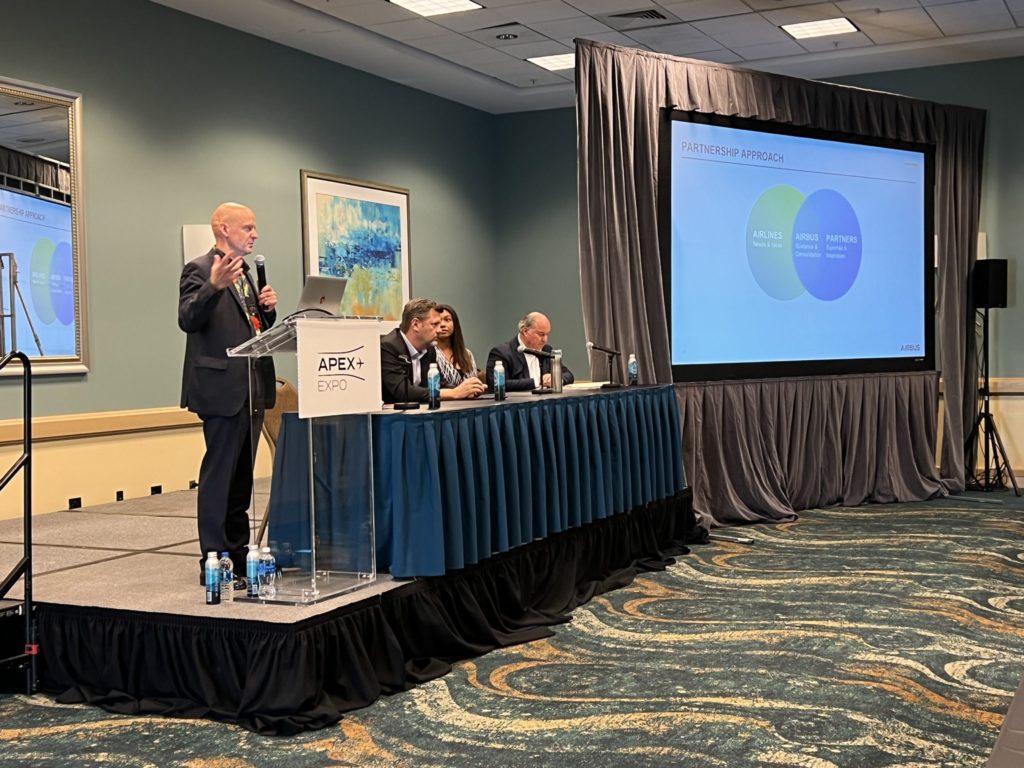Designing sustainable passenger experience initiatives
Share
The final day of APEX/IFSA EXPO saw a panel discussion on designing sustainable passenger experience initiatives.

The session panellists included Boeing Director of Product Marketing for Sustainability Tasha Jackson, KLM CXO Boet Kreiken, SAUDIA Chief Commercial Officer Arved Muhlen and Airbus Head of Cabin & Market Insights Stefan List. The moderator was APEX/IFSA CEO Dr Joe Leader.
Here are some of the highlights:
Reaching net zero through four different areas
Though aviation plays an essential role in the global economy, Boeing’s Tasha Jackson said “it does come with a cost, and that cost is the emissions we create.”
According to Tasha Jackson, the strategy that will take us to net zero involves four different areas. The first is much more fuel efficient aircraft. Added to that are operational efficiencies. “These two pathways are things that we can take advantage of today.”
Tasha Jackson said that the next two pathways might involve more investment and supply, but they are looking to the future. They involve new fuel sources such as Sustainable Aviation Fuel (SAF). Finally there are new technologies such as hydrogen and electric aviation, with Boeing having invested in Wisk’s electric ‘air taxis’ along with the Kitty Hawk Corporation.
Tasha Jackson also outlined Boeing’s ecodemonstrator programme, “a flying testbed, we take all these technologies out of the lab and we test them in the air.”
Boeing is in the tenth anniversary of this programme and in that time it has tested over 200 innovative technologies, with more than 15 separate partners.
Work with partners is key
Tasha Jackson’s demonstration was followed by Stefan List from Airbus. He started by outlining some passenger research. This showed that over 6/10 passengers felt committed to change their personal flight behaviour in the name of sustainability.
According to Stefan List, Airbus has three main areas it is focused on. The first is zero emission technology, such as the development of hydrogen aircraft.
The second is digitalization and artificial intelligence, “we need the tools and data in place that we really can prove that we are moving to a net zero target.” And finally there is the use of new and lightweight materials.
One example of a new material in the cabin is the “bionic partition”, something Stefan List had been involved in developing with partners in Silicon Valley. New design principles and 3D printing were applied, and the weight was reduced by 50%.
Finally, Stefan List advocated the need to “inspire the passenger and educate the passenger about sustainability. Because you are a captive audience when on board. Use the time to ensure that the 60% (who feel they should change their flying behaviour), still want to fly in the future.”
That point very much chimes in with some of the other discussions that were had at APEX EXPO, that in cabin sustainability is important as the passenger sees and experiences it, and it serves as a headline for other initiatives.
The airline perspective
The Airbus and Boeing presentations were followed by two airlines.
SAUDIA chief commercial officer Arved Muhlen talked about some of the work that the Saudi national carrier had done in the sustainability space.
This included winning the award for best customer engagement as part of the SkyTeam sustainable flight challenge, when SAUDIA staged the first ever in-flight sustainability lab on a flight from Jeddah to Madrid where sustainability ideas were crowd-sourced from passengers.
KLM is of course one of the leaders in airline sustainability and CXO Broet Kreiken said that in addition to creating value and being cost efficient, everything the airline does now needs to be sustainable.
Codeshares are for example now checked for sustainability, suppliers contracts have it included, and every business unit even has its own sustainability ambassador.
Everything is also measured. Air France-KLM was in fact one of the first airline to sign up to the Science Based Targets Initiative
Like Stefan List from Airbus, Broet Kreiken emphasised passenger communication and education: “Our passengers, our customers our guests, they feel guilty. We have talked for many hours with our global accounts. So we have to help them to understand what we are doing.”
Finally, when moderating the session, APEX CEO Dr Joe Leader re-emphasised the need for airlines to collaborate in helping the industry as a whole reach sustainability targets:
“One of the things that we found is that when we talk with our airlines, they are willing to share 80-90% of their sustainable product information with one another. Not 100. It’s that final 10-20%, they want as a competitive advantage.”
As a result, there needs to be a concerted effort to build trust, and the sustainable supplier standard which APEX/IFSA announced today is one step in that direction.


